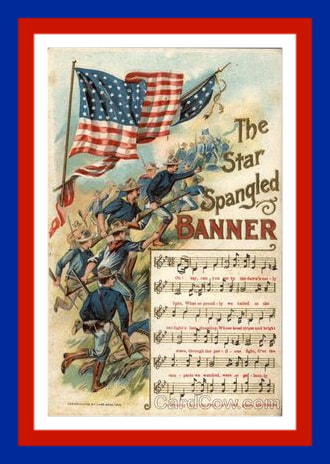|
An argument has re-emerged that the US National Anthem is racist. In part, it pertains to one line in the third verse (which is almost never sung any more):
And where is that band who so vauntingly swore That the havoc of war and the battle's confusion, A home and a country, should leave us no more? Their blood has washed out their foul footsteps' pollution. No refuge could save the hireling and slave From the terror of flight, or the gloom of the grave: And the star-spangled banner in triumph doth wave, O'er the land of the free and the home of the brave. To what was Francis Scott Key referring by saying there would be no salvation for slaves? The NAACP is mounting an on-going campaign to replace the National Anthem. Wiki tells us, “In November 2017, the California Chapter of the NAACP called on Congress to remove "The Star-Spangled Banner" as the national anthem. Alice Huffman, California NAACP president, said: "It's racist; it doesn't represent our community, it's anti-black." (As reported on November 8, 2017 by CBS station KOVR-TV). In 2021 the campaign was re-joined. Wikipedia explains: “Absent elaboration by Francis Scott Key prior to his death in 1843, some have speculated more recently about the meaning of phrases or verses, particularly the phrase "the hireling and slave" from the third stanza. According to British historian Robin Blackburn, the phrase alludes to the thousands of ex-slaves in the British ranks organized as the Corps of Colonial Marines, who had been liberated by the British and demanded to be placed in the battle line "where they might expect to meet their former masters." Mark Clague, a professor of musicology at the University of Michigan, argues that the "middle two verses of Key's lyric vilify the British enemy in the War of 1812" and "in no way glorifies or celebrates slavery." Clague writes that "For Key ... the British mercenaries were scoundrels and the Colonial Marines were traitors who threatened to spark a national insurrection." This harshly anti-British nature of Verse 3 led to its omission in sheet music in World War I, when the British and the U.S. were allies. Responding to the assertion of writer Jon Schwarz of The Intercept that the song is a "celebration of slavery," Clague argues that the American forces at the battle consisted of a mixed group of White Americans and African Americans, and that "the term “freemen,” whose heroism is celebrated in the fourth stanza, would have encompassed both." “Others suggest that "Key may have intended the phrase as a reference to the Royal Navy's practice of impressment which had been a major factor in the outbreak of the war, or as a semi-metaphorical slap at the British invading force as a whole (which included a large number of mercenaries)." (Here ends the Wikipedia explanation.) These days we criticize traditions based on contemporary interpretations. Literature, monuments, and especially patriotic commemorations are subject to review and rejection. So the question of whether the National Anthem is racist or not does not entirely rest on what it originally meant. Whether something is worthy of honor and respect today depends on its meaning to people at present. It can be argued that nobody cares about verse 3. The third verse is removable. In fact it has been removed. It is never sung and is not a relevant part of the anthem as it is used. The US National Anthem consists of only one verse, ask anybody.. So, this whole debate must be about something else than the content of that one controversial phrase. What that is is not hard to find. It is not really the song that is at fault, but the whole concept that the anthem symbolizes. The objection raised by Alice Huffman of the NAACP five years ago was in the context of Colin Kaepernick “taking the knee” during pre-game playing of the National Anthem. That act of protest has become a major political hot-button issue, greatly expanded by Donald Trump and his part of the Republican Party. But “The Star Spangled Banner” is here to stay. It is not about to be replaced. It is deeply rooted in the national psyche. There are no viable contenders, although there are better songs, no doubt about that. But the more pervasive issue is the nature of the United States of America in our time. Until that has been agreed upon what we sing and our posture when we sing it is really a peripheral matter The heart of the matter is the US fight over what the country stands for. It is problematic to call the USA “the land of the free” when so many people are in many ways not free. They do not have equal access to the nation’s promises. It is impossible for them to feel pride and gratitude for being marginalized and deprived of equality and respect. The National Anthem does not even hint at efforts to repent and improve. Those who are proudly singing seem to have achieved the American dream and haven’t the slightest concern about Americans who have been prevented from it. And that is what hurts and makes one want to pray on bended knee for the USA to improve.
0 Comments
Leave a Reply. |
AuthorRev. Dr. Kenneth Dobson posts his weekly reflections on this blog. Archives
March 2024
Categories |
| Ken Dobson's Queer Ruminations from Thailand |
|

 RSS Feed
RSS Feed
